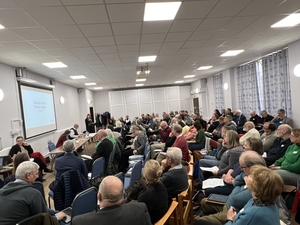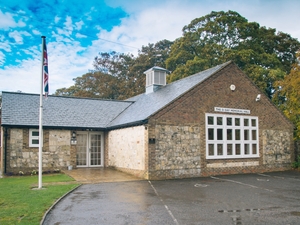Diocesan Finance
The Diocese of Portsmouth works like a network or family of parishes. Those parishes help each other through prayer, finances and mutual support. It's our system of parish share that ensures we have a presence in every community and can offer ministry and mission to all who come to us. This video helps to explain how it works.
Parish Share
One of the things that binds our diocese together is the shared commitment to fund our ministry for God’s mission across this area. Each parish volunteers to pay a certain amount into the central diocesan budget, to be used to help fund mission and ministry. Find out more about parish share on our Parish Share Explained page. We’ve also included answers to some of the more common questions we receive about parish share.
Our diocese has recently reviewed the formula that would determine the exact allocation of parish share payments across our diocese. Although the principle has been established that larger congregations and wealthier parishes might pay more into a central pot than smaller congregations or poorer parishes, the precise way in which we calculate this was altered after extensive consultation with parishes.
In November 2024, our Diocesan Synod agreed with the recommendations of our Parish Share Review Group, which you can read here. Among the recommendations is one that suggests any parish that finds its parish share unaffordable should be able to have constructive dialogue with the Diocesan Secretary, alongside greater openness and transparency about finances overall.
The group decided that the calculations around parish share should still be based on a measure of Average Weekly Attendance, but calculated over a three, four and then five-year rolling average, to ensure all figures are post-Covid ones. It should also be based on relative affluence, based on the average net disposable income for each parish. Synod members heard there would also be comprehensive transitional arrangements to smooth over the effects of large changes, upwards or downwards, in the amount of parish share requested from each parish from 2025 onwards.
You may also want to read Bishop Jonathan's theology of parish share (below) and also download our leaflet that explains some of the principles behind parish share.
Latest documents
-
Parish Share
Theology of parish share 2024
Bishop Jonathan has written this paper about the theology behind our shared commitment to paying ... Read more
-
Parish Share
Parish Share Explained
Accounts and budgets
Our Diocesan Synod agrees a budget each November for the next calendar year. The setting of this budget helps to determine how much each of our parishes is asked to contribute in parish share.
Our annual accounts for each calendar year are available by the summer of the next calendar year. Click here for details of our accounts and budgets from previous years.
Links
- Diocesan Budget for 2025, approved at November 2024 Synod
- End of Year Accounts 2023, given at June 2024 Synod
- Diocesan Budget for 2024, approved at November 2023 Synod
- End of Year Accounts 2022, given at June 2023 Synod
- Summary of discussions at June 2022 Synod (including consideration of the annual report from 2021)
- End of Year Accounts 2021, given at June 2022 Synod
- Summary of discussions at November 2022 Synod (including consideration of the budget for 2023)
- Diocesan Budget papers, presented at November 2022 Synod
Diocesan finance committees
The body which is ultimately responsible for approving our annual budget is our Diocesan Synod, which includes elected representatives from each deanery. But the Bishop’s Council and finance committees are also involved in the process of setting budgets and monitoring our finances. There are two finance committees, each with slightly different roles:
- Audit Committee: its main purpose is to carry out detailed monitoring and evaluation of key financial information on behalf of the Portsmouth Diocesan Board of Finance (PDBF), and the Bishop’s Council; review regular financial reports and indicators; and make recommendations to the PDBF and Bishop's Council on matters of financial strategy, policy and management.
- Diocesan Deaneries Finance Committee: (which includes all deanery treasurers): its main purpose is to carry out detailed monitoring and evaluation of parish share contributions; agree the approach to individual parish share backlogs with the Diocesan Stewardship Advisor; and communicate financial matters to Deanery Finance Committees.
Diocesan investments
Our diocese has a small investment advisory group that advises staff on how to invest our assets. The Diocese of Portsmouth manages its investments ethically, in line with the ethical policies of the Church of England national investing bodies – including on climate change – guided by the recommendations of the Ethical Investment Advisory Group.


